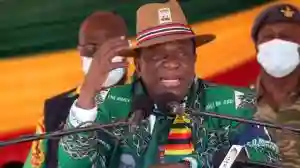Political commentators have accused President Emmerson Mnangagwa’s government of trying to instill fear in citizens and the opposition after Cabinet last Tuesday approved the principles for enacting the Criminal Law (Codification and Reform) Amendment Bill.
The proposed legislation contains clauses that seek to punish “unpatriotic citizens” and enforce patriotism.
Critics, however, say the proposed law will further close the democratic space as the country heads to the 2023 general elections.
University of Zimbabwe political scientist Eldred Masunungure said the Bill shows dictatorial tendencies. He said:
The Bill is just there to inject fear into the targeted institutions and political parties.
It may backfire for the regime as this defeats the whole purpose of re-engagement.
The Bill will also target key leaders in the opposition, but the difficulty of enforcing the proposed Act is that it will need a lot of surveillance and it is difficult.
Another political commentator, Rejoice Ngwenya, said the Bill curtails individuals’ right to freedom of expression. Said Ngwenya:
It will create a basis for prosecution based on legislative falsehoods.
This can be contested in the Constitutional Court because we are free to express ourselves.
ZANU PF Chief Whip Pupurai Togarepi first suggested the need for a Patriotic Act in 2018 to punish Zimbabweans who advocate for economic sanctions to be imposed on the country.
ZANU PF later moved a motion in Parliament on the proposed Bill in March 2021.
Last Tuesday, Cabinet approved the principles for enacting the Criminal Law (Codification and Reform) Amendment Bill, which will make it a criminal offence for citizens to advocate for sanctions or embargoes to be imposed on Zimbabwe by foreign governments.
United States-based researcher Madison Mandell said the Criminal Law (Codification and Reform) Amendment Bill seeks to close down the remaining democratic space in Zimbabwe. Mandell said:
The vague language of the Bill creates a rare opportunity for the ruling party to apply it as a means of stifling freedom of expression, which effectively would close down any remaining democratic ‘space’ in Zimbabwe.
The legislation criminalizes almost any speech that is critical of the government or that draws attention to the state’s dire issues.
These limitations on free speech not only violate the freedoms guaranteed by the 2013 constitution but also jeopardise the prospects to strengthen democracy.
The ability to hold governments accountable is one of the main reasons that free expression is central to democracy; the Bill is a complete assault on accountability.

